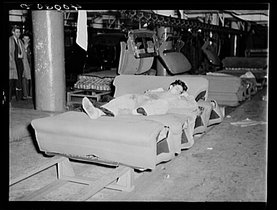 It always amazes me how strict people can be about rest periods. Here’s the thing: you can’t get it wrong. Sometimes people say you shouldn’t sit down, and they’re quite insistent. Keep standing, keep moving, keep your energy up – and there is a benefit to it, it’s about intention. But it always depends on what you’re doing. And not every workout is about psyching yourself up for some crazy intense training. Often, we might bitch about how other people spend too much time on their phones at the gym. But if you’ve just done a set of leg press or whatever, I don’t care if you check out all the dinners your friends have been sharing on facebook from the night before, while you recover enough to be able to do another set. And who cares, really? What is the point of resting? Recovery. So you can do stuff again, and do it well. Think about what you want to achieve. The reason we are told not to check facebook, or gossip, or play with whatever, or to sit down in between sets is because of focus. The idea is to foster a single-pointed concentration, to dedicate your attention to the work at hand, and to succeed at what you put your mind to.
This is a pure intention, and it’s useful. But it’s also boring to just pace up and down the room, waiting until you’re ready to go again, and not everything needs to be serious all the time. Mindfulness isn’t about doing any particular thing, it’s more about being aware of the thing that you actually are doing, whatever that is. Sometimes it’s good to preserve attention and focus, to protect them, to refuse to engage in conversation with your fellow gym-goers, but that’s not what every workout is about. Of the ways I spend my time resting, the one that sounds the best I think, comes down to cleaning. Often I’m training at my place of work, and in between sets I’ll put away random weights, sort out bits and pieces, and so my rest periods feel productive. I’ll get bored pretty quickly if I need to rest for a while – either I’ll go again too early, and the quality of my next set will suffer, or I’ll be wandering around, just waiting. There’s a discipline to waiting. To patience. I could work more at that, but I don’t feel the need to make my training more robotic. Sometimes I rest with stillness, sometimes not. One time I was working out with a friend, and we started dancing in between sets. Not like, full dancing, just a little bop. Someone commented, and my friend said – “oh no, weightlifting is what I do when I’m resting in between dancing sets!” Some years ago I went to train at the Hawthorn Weightlifting Club. They do the Olympic lifts – so they’re always training heavy squats, cleans, snatches and the like. They’ll set up in front of their lifting station – there’s a barbell, and a bunch of chairs. They’ll lift heavy, then sit the hell down, reflect upon what they’ve done, and go again when they’re ready. It really changed the way I thought about heavy lifting. Why not sit down and rest properly? Focus only on the work at hand. There’s no need to just randomly keep moving, not when you’re focused on something very specific, and when that thing demands your full attention. They don’t concern themselves with keeping their heart-rate up, or doing circuit style work, or burning as many calories as they can, because the objective is very clear. Improve movement patterns, get stronger, faster, and win competitions. So – although the training program can be quite detailed – the basic philosophy is simply this: lift heavy, think about what you’ve done, rest properly, and repeat. And as for timing rest periods – how long should it be? 45 seconds? 90? There are all sorts of arguments, but if you’re following a standardised program, maybe you’ve got five sets of five reps to do, and you’re supposed to rest for 90 seconds… I think as a general rule, the heavier the set or the more intense the work, the longer you need to rest, but even if you follow the program as best you can, there are still questions – were you working at 80% of your capacity? Does the program assume you were working at 90%? And then, should you rest for more or less time? In the end, of course I always say rest for as long as you like. That will vary massively, depending on the day, the exercises you’re practicing, and what you want to get out of your training, but you’ll learn more by paying attention to how you feel in the context of your programming, than you will by ignoring your own body in an attempt to ‘do the program right’. Like everything else, people can get opinionated. But there’s no wrong way to rest. Some exercises demand more attention, and if something feels inefficient or awkward, spend your rest period in reflection. But other exercises do not require as much attention, sometimes you’ll rush from one exercise to another, sometimes you won’t, sometimes you’ll need to attend to something else that’s going on in your life, sometimes you won’t. There’s no wrong way to rest, just as there’s no wrong way to train – just work at what you want to work at, and set up your training in a way that’s appropriate to your temperament and objectives. And then fuck around with your phone, or sit in silent contemplation, or psyche yourself up, chat, clean the gym, or whatever. It is your time, after all.
0 Comments
Leave a Reply. |
